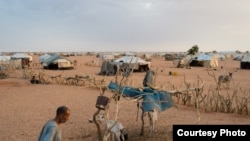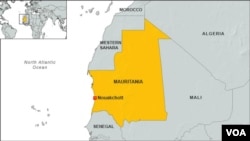DAKAR —
Despite the military success of the now three month-old French-led intervention in northern Mali, aid agencies say the situation of more than 450,000 Malian refugees and IDPs is getting worse, not better.
International aid organizations are calling for ramped up assistance for displaced Malians who have fled the north in the past 16 months and don’t look to be returning home any time soon.
Valery Mbaoh Nana is the spokesperson for the International Committee of the Red Cross in Bamako. “What is going on now, in northern Mali now, unfortunately, is not very good. We’ve witnessed some security problems in some major cities, like Gao, in the past weeks," Nana said. "And that makes these IDPs afraid to go back home. They are expecting to have a better security situation before they go back home.”
Fighting continues in northern Mali, even though French and Malian troops have driven Islamist militants from the towns they once controlled.
Since French and Malian troops liberated the town of Gao on Jan. 27, there have multiple suicide bombings and raids by jihadist fighters.
The U.N. refugee agency says about 180,000 Malians have fled to Mauritania, Niger and Burkina Faso, many of them to makeshift refugee camps. However, the vast majority leaving the north -- 280,000 people -- fled south inside Mali, many of them staying with relatives and friends, others simply living outdoors.
Karl Nawezi is the Doctors Without Borders’ director in Mauritania, where he said many of the 70,000 Malians at the Mbera refugee camp still lack basic necessities like adequate food, clean water and shelter.
“In January the camp received more than 15,000 people coming from Mali because of the military operations that started, and now the conditions are not so good in the camp. I think that efforts have been made in order to make sure that people receive all the things that they need for their life, but the situation is really dependent on humanitarian aid,” Nawezi explained.
He said refugees at Mbera camp are currently surviving on the bare minimum.
In some parts of the camp, there are four latrines for every 12,000 people. He said many families are living in makeshift tents.
Nawezi said the number of children suffering from severe malnutrition has more than doubled since January. This is despite the fact that 85 percent of the new children arrived at the camp in good health.
As displaced Malians settle in for the long haul, aid workers say they need to scale up assistance to prevent this humanitarian crisis from getting even worse.
International aid organizations are calling for ramped up assistance for displaced Malians who have fled the north in the past 16 months and don’t look to be returning home any time soon.
Valery Mbaoh Nana is the spokesperson for the International Committee of the Red Cross in Bamako. “What is going on now, in northern Mali now, unfortunately, is not very good. We’ve witnessed some security problems in some major cities, like Gao, in the past weeks," Nana said. "And that makes these IDPs afraid to go back home. They are expecting to have a better security situation before they go back home.”
Fighting continues in northern Mali, even though French and Malian troops have driven Islamist militants from the towns they once controlled.
Since French and Malian troops liberated the town of Gao on Jan. 27, there have multiple suicide bombings and raids by jihadist fighters.
The U.N. refugee agency says about 180,000 Malians have fled to Mauritania, Niger and Burkina Faso, many of them to makeshift refugee camps. However, the vast majority leaving the north -- 280,000 people -- fled south inside Mali, many of them staying with relatives and friends, others simply living outdoors.
Karl Nawezi is the Doctors Without Borders’ director in Mauritania, where he said many of the 70,000 Malians at the Mbera refugee camp still lack basic necessities like adequate food, clean water and shelter.
“In January the camp received more than 15,000 people coming from Mali because of the military operations that started, and now the conditions are not so good in the camp. I think that efforts have been made in order to make sure that people receive all the things that they need for their life, but the situation is really dependent on humanitarian aid,” Nawezi explained.
He said refugees at Mbera camp are currently surviving on the bare minimum.
In some parts of the camp, there are four latrines for every 12,000 people. He said many families are living in makeshift tents.
Nawezi said the number of children suffering from severe malnutrition has more than doubled since January. This is despite the fact that 85 percent of the new children arrived at the camp in good health.
As displaced Malians settle in for the long haul, aid workers say they need to scale up assistance to prevent this humanitarian crisis from getting even worse.












